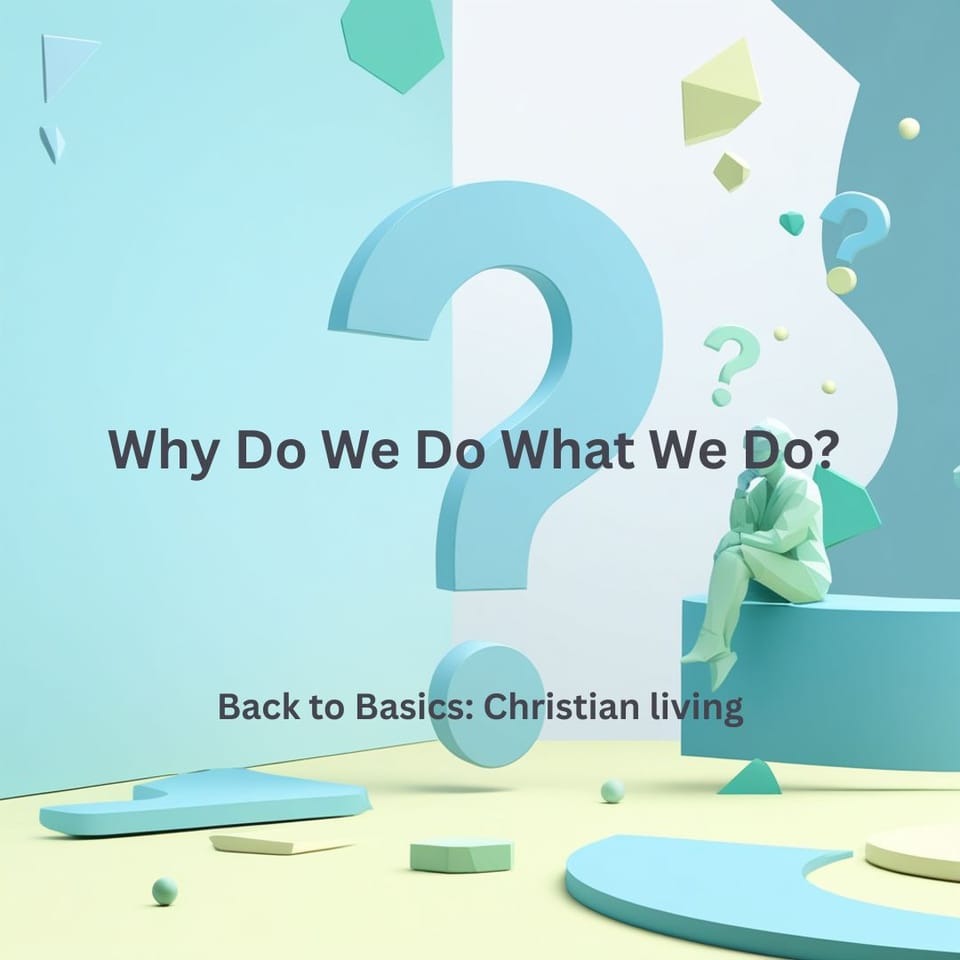Why Do We Do What We Do?

Understanding Our Spiritual Motivations
Have you ever found yourself in the middle of your daily routine—perhaps washing dishes, commuting to work, or even attending church—and suddenly wondered, "Why am I doing this?" This profound question often lurks beneath the surface of our busy lives, occasionally bubbling up when we least expect it.
Today, we want to explore this fundamental question of motivation—not just in our daily tasks, but in our spiritual journey as believers. Why do we worship? Why do we serve? Why do we study Scripture? In essence: Why do we do what we do?
The Heart of Our Actions
The Scriptures are clear that God looks beyond our external actions to examine the true intentions of our hearts. In 1 Samuel, we read, "For the LORD seeth not as man seeth; for man looketh on the outward appearance, but the LORD looketh on the heart" (1 Samuel 16:7, KJV). This piercing truth reminds us that our motivations matter tremendously to God.
Elaine and I have observed over years of ministry that many believers are diligent in their religious activities yet have never deeply examined why they do these things. Are we serving to be seen by others? Are we giving to receive recognition? Are we attending church out of habit or obligation rather than love?
The Apostle Paul challenges us when he writes, "And though I bestow all my goods to feed the poor, and though I give my body to be burned, and have not charity, it profiteth me nothing" (1 Corinthians 13:3, KJV). Even our most sacrificial actions, if done without love as the primary motivation, amount to nothing in God's economy.
Common Motivations We've Observed
In our conversations with fellow believers across different communities, we've noticed several common motivations behind Christian service and worship:
- Fear-Based Obedience: Some serve God primarily out of fear of punishment or negative consequences.
- Obligation and Duty: Others approach their faith as a series of obligations to fulfil, a spiritual checklist to complete.
- Social Acceptance: For some, church involvement is primarily about belonging to a community and gaining social approval.
- Transactional Faith: This approach sees service to God as a way to earn blessings or favours—essentially, "I'll do this for God so He'll do that for me."
- Love-Driven Response: Finally, some serve out of genuine love and gratitude for what Christ has done.
If we're honest, most of us operate from a mixture of these motivations. Even Elaine and I find ourselves serving sometimes out of habit or duty rather than the pure love we aspire to.
The Biblical Model: Love as Our Primary Motivation
When Jesus was asked about the greatest commandment, His answer was profoundly simple: "Thou shalt love the Lord thy God with all thy heart, and with all thy soul, and with all thy mind. This is the first and great commandment. And the second is like unto it, thou shalt love thy neighbour as thyself" (Matthew 22:37-39, KJV).
Love—not fear, not obligation, not social pressure—is meant to be the primary driver of our Christian life. When we truly grasp the depth of God's love for us, demonstrated most powerfully at the cross, our natural response should be love in return.
As John writes, "We love him, because he first loved us" (1 John 4:19, KJV). This simple verse captures the beautiful cycle that should characterize our relationship with God: His initiating love generates responsive love in us.
A Personal Reflection
Several years ago, I (David) went through a difficult season where my ministry felt mechanical. I was teaching, serving, and leading—doing all the "right things"—but the joy had evaporated. Through prayerful reflection, I realised I had slipped into serving primarily from a sense of duty and others' expectations.
Elaine noticed this shift before I did. She gently encouraged me to step back and reconnect with why I began this journey in the first place: my love for Christ and His transformative work in my life. This recalibration wasn't instant, but gradually, as I meditated on God's goodness, the embers of love-driven service began to glow again.
The prophet Jeremiah captures this beautifully when he writes, "The LORD hath appeared of old unto me, saying, Yea, I have loved thee with an everlasting love: therefore with lovingkindness have I drawn thee" (Jeremiah 31:3, KJV). It is God's lovingkindness that draws us to Him—not His power to punish or reward, but His persistent, pursuing love.
Examining Our Own Hearts
We invite you to join us in this heart examination. Consider asking yourself these questions:
- If no one knew about my acts of service or worship, would I still do them?
- Do I find joy in my time with God, or does it feel primarily like an obligation?
- What emotions arise when I think about God—fear, duty, gratitude, love?
- Am I more concerned with external religious performance or internal heart transformation?
The Psalmist prayed, "Search me, O God, and know my heart: try me, and know my thoughts: And see if there be any wicked way in me, and lead me in the way everlasting" (Psalm 139:23-24, KJV). This humble invitation for God to examine our motivations is one we would be wise to echo.
The Beautiful Transformation
When our actions flow from genuine love rather than lesser motivations, several beautiful things happen:
First, our service becomes sustainable. Duty-driven service often leads to burnout, but love-driven service—while still requiring discipline—replenishes rather than depletes us. As Isaiah writes, "But they that wait upon the LORD shall renew their strength; they shall mount up with wings as eagles; they shall run, and not be weary; and they shall walk, and not faint" (Isaiah 40:31, KJV).
Second, our witness becomes authentic. People can sense when our faith is genuine versus when we're simply going through religious motions. A love-motivated life speaks volumes to a watching world.
Third, our relationship with God deepens. God desires relationship above religious activity. As Jesus told Martha, who was distracted with much serving, "But one thing is needful: and Mary hath chosen that good part, which shall not be taken away from her" (Luke 10:42, KJV). Mary's loving attention to Jesus was more valuable than Martha's dutiful service.
Our Prayer for You
As we conclude this reflection, Elaine and I pray that your heart would be increasingly captivated by God's amazing love. We pray that your service, worship, and obedience would flow not primarily from obligation but from a heart overflowing with gratitude and love.
As Paul wrote, "For the love of Christ constraineth us" (2 Corinthians 5:14, KJV). May Christ's love be the constraining, compelling force behind all that you do.
Until next time, remember that God is more concerned with why you serve than what you do. May your heart's cry echo the words of the hymn writer: "O to grace how great a debtor daily I'm constrained to be!"
Grace & peace to you all,
David & Elaine
Back to Basics: Christian living
Key Takeaways:
- God looks at our hearts and motivations, not just our external actions
- Many believers serve from mixed motivations: fear, obligation, social acceptance, or transactional thinking
- Love should be our primary motivation for Christian service and worship
- When we serve from love rather than duty, our service becomes sustainable and authentic
- Regular self-examination of our motivations helps realign our hearts with God's purposes





